John Milton
John Milton, English poet, pamphleteer, and historian, is best known for writing "Paradise Lost," widely regarded as the greatest epic poem in English.

(1608-1674)
John Milton is best known for Paradise Lost , widely regarded as the greatest epic poem in English. Together with Paradise Regained , it formed his reputation as one of the greatest English writers. In his prose works he advocated the abolition of the Church of England. His influence extended through the English civil wars and also to the American and French revolutions.

Early Life & Education
John Milton was born in London on December 9, 1608 to John and Sara Milton. He had an older sister Anne, and a younger brother Christopher, and several siblings who died before reaching adulthood. As a child, John Milton attended St. Paul’s School, and in his lifetime he learned Latin, Greek, Italian, Hebrew, French, and Spanish. He attended Christ’s College, Cambridge, graduating in 1629 with a Bachelor of Arts degree, and 1632 with a Master of Arts.
Poetry, Politics, and Personal Life
After Cambridge, Milton spent six years living with his family in Buckinghamshire and studying independently. In that time, he wrote “On the Morning of Christ’s Nativity,” “On Shakespeare,” “L’Allegro,” “Il Penseroso,” and "Lycidas," an elegy in memory of a friend who drowned.
Milton was a Puritan who believed in the authority of the Bible, and opposed religious institutions like the Church of England, and the monarchy, with which it was entwined. He wrote pamphlets on radical topics like freedom of the press, supported Oliver Cromwell in the English Civil War, and was probably present at the beheading of Charles I . Milton wrote official publications for Cromwell’s government.
It was during these years that Milton married for the first time. In 1642, when he was 34, he married 17-year-old Mary Powell. The two separated for several years, during which time Milton wrote The Divorce Tracts , a series of publications advocating for the availability of divorce. The couple reunited and had four children before Mary died in 1652. It was also in 1652 that Milton became totally blind. In 1656, he married Katherine Woodcock. She died in 1658.
Near the end of 1659, Milton went to prison because of his role in the fall of Charles I and the rise of the Commonwealth. He was released, probably due to the influence of powerful supporters. The monarchy was reestablished in 1660 with Charles II as king.
Paradise Lost
After his release from prison, Milton married for the third time, this time to Elizabeth Minsull. In 1667, he published Paradise Lost in 10 volumes. It is considered his greatest work and the greatest epic poem written in English. The free-verse poem tells the story of how Satan tempted Adam and Eve, and their expulsion from the Garden of Eden. In 1671, he published Paradise Regained , in which Jesus overcomes Satan’s temptations, and Samson Agonistes , in which Samson first succumbs to temptation and then redeems himself. A revised, 12-volume version of Paradise Lost was published in 1674.
John Milton died in England in November 1674. There is a monument dedicated to him in Poet’s Corner in Westminster Abbey in London.
QUICK FACTS
- Birth Year: 1608
- Birth date: December 9, 1608
- Birth City: London
- Birth Country: England
- Gender: Male
- Best Known For: John Milton, English poet, pamphleteer, and historian, is best known for writing "Paradise Lost," widely regarded as the greatest epic poem in English.
- Astrological Sign: Sagittarius
- Occupations
- Death Year: 1674
- Death date: November 8, 1674
- Death City: London
- Death Country: England
We strive for accuracy and fairness.If you see something that doesn't look right, contact us !
CITATION INFORMATION
- Article Title: John Milton Biography
- Author: Biography.com Editors
- Website Name: The Biography.com website
- Url: https://www.biography.com/authors-writers/john-milton
- Access Date:
- Publisher: A&E; Television Networks
- Last Updated: August 15, 2019
- Original Published Date: April 2, 2014
Famous British People

The Real Royal Scheme Depicted in ‘Mary & George’

William Shakespeare

Anya Taylor-Joy
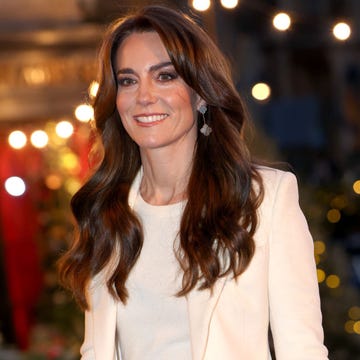
Kate Middleton, Princess of Wales

Kensington Palace Shares an Update on Kate

Amy Winehouse
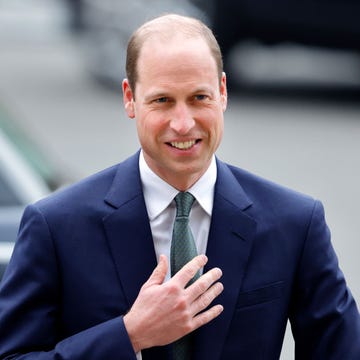
Prince William
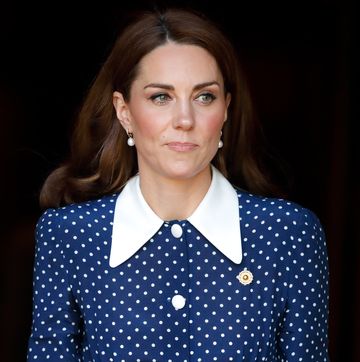
Where in the World Is Kate Middleton?
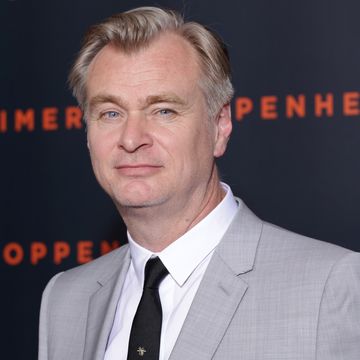
Christopher Nolan

Emily Blunt
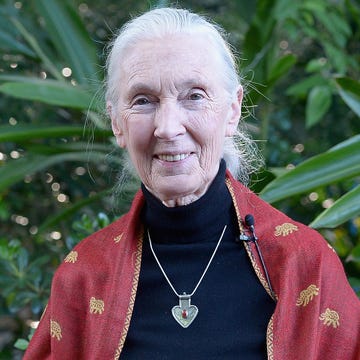
Jane Goodall
- National Poetry Month
- Materials for Teachers
- Literary Seminars
- American Poets Magazine
Main navigation
- Academy of American Poets
User account menu

Search more than 3,000 biographies of contemporary and classic poets.
Page submenu block
- literary seminars
- materials for teachers
- poetry near you
John Milton
John Milton was born in London on December 9, 1608, into a middle-class family. He was educated at St. Paul’s School, then at Christ’s College, Cambridge, where he began to write poetry in Latin, Italian, and English, and prepared to enter the clergy.
After university, however, he abandoned his plans to join the priesthood and spent the next six years in his father’s country home in Buckinghamshire, following a rigorous course of independent study to prepare for a career as a poet. His extensive reading included both classical and modern works of religion, science, philosophy, history, politics, and literature. In addition, Milton was proficient in Latin, Greek, Hebrew, French, Spanish, and Italian, and obtained a familiarity with Old English and Dutch as well.
During his period of private study, Milton composed a number of poems, including “ On the Morning of Christ’s Nativity ,” “ On Shakespeare ,” “L’Allegro,” “Il Penseroso,” and the pastoral elegy “ Lycidas .” In May of 1638, Milton began a thirteen-month tour of France and Italy, during which he met many important intellectuals and influential people, including the astronomer Galileo, who appears in Milton’s tract against censorship, “Areopagitica.”
In 1642, Milton returned from a trip into the countryside with a sixteen-year-old bride, Mary Powell. Even though they were estranged for most of their marriage, Powell bore him three daughters and a son before her death in 1652. Milton later married twice more: Katherine Woodcock in 1656, who died giving birth in 1658, and Elizabeth Minshull in 1662.
During the English Civil War, Milton championed the cause of the Puritans and Oliver Cromwell, and wrote a series of pamphlets advocating radical political topics including the morality of divorce, the freedom of the press, populism, and sanctioned regicide. Milton served as secretary for foreign languages in Cromwell’s government, composing official statements defending the Commonwealth. During this time, Milton steadily lost his eyesight, and was completely blind by 1651. He continued his duties, however, with the aid of Andrew Marvell and other assistants.
After the Restoration of Charles II to the throne in 1660, Milton was arrested as a defender of the Commonwealth, fined, and soon released. He lived the rest of his life in seclusion in the country, completing the blank-verse epic poem Paradise Lost in 1667, as well as its sequel Paradise Regained and the tragedy Samson Agonistes both in 1671. Milton oversaw the printing of a second edition of Paradise Lost in 1674, which included an explanation of “why the poem rhymes not,” clarifying his use of blank verse, along with introductory notes by Marvell. Milton died shortly afterwards, on November 8, 1674, in Buckinghamshire, England.
Paradise Lost, which chronicles Satan’s temptation of Adam and Eve and their expulsion from Eden, is widely regarded as Milton’s masterpiece and one of the greatest epic poems in world literature. Since its first publication, the work has continually elicited debate regarding its theological themes, political commentary, and its depiction of the fallen angel, Satan, who is often viewed as the protagonist of the work. The epic has had wide-reaching effect, inspiring other long poems, such as Alexander Pope ’s The Rape of the Lock , William Wordsworth ’s The Prelude and John Keats ’s Endymion , as well as Mary Shelley’s novel Frankenstein . It has also deeply influenced the work of Percy Bysshe Shelley and William Blake, who illustrated an edition of Paradise Lost .
Related Poets
Newsletter sign up.
- Academy of American Poets Newsletter
- Academy of American Poets Educator Newsletter
- Teach This Poem
Biography of John Milton, Author of Paradise Lost
The English author wrote much more than his iconic epic poem
Stock Montage / Getty Images
- Authors & Texts
- Top Picks Lists
- Study Guides
- Best Sellers
- Plays & Drama
- Shakespeare
- Short Stories
- Children's Books
:max_bytes(150000):strip_icc():format(webp)/ThoughtCo_Amanda_Prahl_webOG-48e27b9254914b25a6c16c65da71a460.jpg)
- M.F.A, Dramatic Writing, Arizona State University
- B.A., English Literature, Arizona State University
- B.A., Political Science, Arizona State University
John Milton (December 9, 1608 – November 8, 1674) was an English poet and intellectual who wrote during a period of political and religious turmoil. He’s best known for his epic poem Paradise Lost , which depicts the fall of Lucifer and the temptation of mankind.
Fast Facts: John Milton
- Full Name: John Milton
- Known For: In addition to his epic poem Paradise Lost , Milton produced a considerable amount of poetry, as well as major prose works defending republican virtues and some degree of religious tolerance during the English Civil War.
- Occupation: Poet and author
- Born: December 9, 1608 in London, England
- Died: November 8, 1674 in London, England
- Parents: John and Sarah Milton
- Spouses: Mary Powell (m. 1642-1652), Katherine Woodcock (m. 1656-1658), Elizabeth Mynshull (m. 1663-1674)
- Children: Anne, Mary, John, Deborah, and Katherine Milton
- Education: Christ's College, Cambridge
Milton was born in London, the eldest son of John Milton, a skillful composer and professional scrivener (a professional who wrote and copied out documents, as literacy was not widespread ), and his wife Sarah. Milton’s father was estranged from his own father, since the older generation was Catholic and Milton Sr. had become a Protestant. As a boy, Milton was privately tutored by Thomas Young, a well-educated Presbyterian whose influence was likely the beginning of Milton’s radical religious views.
After leaving private tutoring behind, Milton attended St. Paul’s, where he studied classical Latin and Greek, and eventually Christ’s College, Cambridge. His first known compositions are a pair of psalms written when he was only fifteen years old. Although he had a reputation for being especially studious, he came into conflict with his tutor, Bishop William Chappel. The extent of their conflict is disputed; Milton did leave the college for a time—either as punishment or because of widespread illness—and when he returned, he had a new tutor.
In 1629, Milton graduated with honors, ranking fourth in his class. He intended to become a priest in the Anglican church, so he stayed at Cambridge to get his master’s degree. Despite spending several years at the university, Milton expressed a fair bit of disdain for university life—its strict, Latin-based curriculum, the behavior of his peers—but did make a few friends, including the poet Edward King and the dissident theologian Roger Williams, better known as the founder of Rhode Island . He spent some of his time writing poetry, including his first published short poem, "Epitaph on the admirable Dramaticke Poet, W. Shakespeare .”
Private Study and European Travel
After acquiring his M.A., Milton spent the next six years in self-guided study and, eventually, travel. He read extensively, both modern and ancient texts, studying literature, theology, philosophy, rhetoric , science, and more, mastering several languages (both ancient and modern) as well. During this time, he continued to write poetry, including two masques commissioned for wealthy patrons, Arcades and Comus .
In May 1638, Milton began traveling through continental Europe. He traveled through France, including a stop in Paris, before moving on to Italy. In July 1683, he arrived in Florence, where he found welcome among the intellectuals and artists of the city. Thanks to his connections and reputation from Florence , he was also welcomed when he arrived in Rome months later. He intended to continue on to Sicily and Greece, but in the summer of 1639, he instead returned to England after the death of a friend and increased tensions.
Upon returning to England, where religious conflicts were brewing, Milton began writing tracts against episcopacy, a religious hierarchy that places local control in the hands of authorities called bishops. He supported himself as a schoolmaster and wrote tracts advocating for the reform of the university system. In 1642, he married Mary Powell, who, at sixteen, was nineteen years his junior. The marriage was unhappy and she left him for three years; his response was to publish pamphlets arguing for the legality and morality of divorce, which brought him some major criticism. Ultimately, she did return, and they had four children together. Their son died in infancy, but all three daughters lived to adulthood.
Political Posting and Pamphleteer
During the English Civil War , Milton was a pro-republican writer and defended the regicide of Charles I, the right of citizens to hold a monarchy accountable, and the principles of the Commonwealth in multiple books. He was hired by the government as Secretary for Foreign Tongues, ostensibly to compose government correspondence in Latin, but also to act as a propagandist and even a censor .
In 1652, Milton’s defense of the English people, Defensio pro Populo Anglicano , was published in Latin. Two years later, he published a pro-Oliver Cromwell follow-up as a rebuttal to a royalist text that also attacked Milton personally. Although he had published a collection of poems in 1645, his poetry was largely overshadowed at the time by his political and religious tracts.
That same year, however, Milton became almost entirely blind, mostly likely due to bilateral retinal detachment or glaucoma . He continued to produce both prose and poetry by dictating his words to assistants. He produced one of his most famous sonnets, “When I Consider How My Life Is Spent,” during this era, musing on his loss of sight. In 1656, he married Katherine Woodcock. She died in 1658, months after giving birth to their daughter, who also died.
The Restoration and Final Years
In 1658, Oliver Cromwell died and the English Republic fell into a mess of warring factions. Milton stubbornly defended his ideals of republicanism even as the country shifted back towards a monarchy, denouncing the concept of a church dominated by the government and the very concept of monarchy.
With the Restoration of the monarchy in 1660, Milton was forced into hiding, with a warrant out for his arrest and orders for all his writings to be burned. Eventually, he was pardoned and was able to live out his final years without fear of imprisonment. He remarried once more, to 24-year-old Elizabeth Mynshull, who had a strained relationship with his daughters.
During this final period of his life, Milton continued writing prose and poetry. The majority was not overtly political, save for a few publications arguing for religious toleration (but only between Protestant denominations, excluding Catholics and non-Christians) and anti-absolute monarchy. Most crucially, he finished Paradise Lost , an epic poem in blank verse narrating the fall of Lucifer and of mankind, in 1664. The poem, considered his magnum opus and one of the masterpieces of the English language, demonstrates his Christian/humanist philosophy and is famous—and, occasionally, controversial—for portraying Lucifer as three-dimensional and even sympathetic.
Milton died of kidney failure on November 8, 1674. He was buried in the church of St Giles-without-Cripplegate in London, after a funeral attended by all of his friends from intellectual circles. His legacy lives on, influencing generations of writers who came after (especially, but not solely, due to Paradise Lost ). His poetry is as revered as his prose tracts, and he is often considered, alongside writers such as Shakespeare, to be up for the title of the greatest English writer in history.
- Campbell, Gordon and Corns, Thomas . John Milton: Life, Work, and Thought . Oxford: Oxford University Press, 2008.
- “John Milton.” Poetry Foundation, https://www.poetryfoundation.org/poets/john-milton.
- Lewalski, Barbara K. The Life of John Milton . Oxford: Blackwells Publishers, 2003.
- Paradise Lost Study Guide
- Metaphysical Poetry and Poets
- Biography of Alexander Pope, England's Most Quoted Poet
- Biography of John Keats, English Romantic Poet
- An Introduction to Blank Verse
- English Civil War: An Overview
- Biography of William Blake, English Poet and Artist
- The Renaissance Writers Who Shaped the Modern World
- The Life and Work of Voltaire, French Enlightenment Writer
- Biography of C.S. Lewis, British Writer
- Biography of John Hay, Author and Influential American Diplomat
- A Brief Overview of British Literary Periods
- Octavio Paz, Mexican Poet, Writer, and Nobel Prize Winner
- Biography of Lord Byron, English Poet and Aristocrat
- Carl Sandburg, Poet and Lincoln Biographer
- Biography of Victor Hugo, French Writer
- Paradise Lost
John Milton
- Literature Notes
- John Milton Biography
- Poem Summary
- About Paradise Lost
- Character List
- Summary and Analysis
- Character Analysis
- Character Map
- Critical Essays
- Milton's Universe
- Major Themes in Paradise Lost
- Milton's Grand Style
- Full Glossary for Paradise Lost
- Essay Questions
- Practice Projects
- Cite this Literature Note
Early Years
John Milton was born in London on December 9, 1608. His parents were John Milton, Sr. and Sarah Jeffery, who lived in a prosperous neighborhood of merchants. John Milton, Sr. was a successful scrivener or copyist who also dabbled in real estate and was noted as a composer of liturgical church music. The Miltons were prosperous enough that eventually they owned a second house in the country.
Milton seems to have had a happy childhood. He spoke of his mother's "esteem, and the alms she bestowed." Of his father, Milton said that he "destined me from a child to the pursuits of Literature, . . . and had me daily instructed in the grammar school, and by other masters at home." Though the senior Milton came from a Catholic family, he was a Puritan himself. Milton's religion, therefore, was an outgrowth of family life and not something he chose at a later period in his maturity.
Sometime, as early as age seven but perhaps later, Milton became a student at St. Paul's school, which was attached to the great cathedral of the same name. St. Paul's was a prestigious English public school — what would be called a "private school" in the U.S. Milton spent eight years as a "Pigeon at Paules," as the students were known, and came out a rather advanced scholar. He had studied the Trivium of Grammar, Rhetoric, and Logic and had probably been exposed to the Quadrivium of Mathematics, Geometry, Astronomy, and Music. He had also learned Latin well, was competent in Greek and Hebrew, had a smattering of French, and knew Italian well enough to write sonnets in it. The one language he did not study was English. Some of his language acquisition — Italian — came from private tutors hired by his father.
Also at St. Paul's, the young Milton made a friendship that was among the closest of his life with Charles Diodati. After leaving St. Paul's, the two young men would write each other in Latin. Through his friendship with Diodati, Milton came into contact with many of the foreign residents of London.
In 1625, Milton matriculated at Christ's College, Cambridge, intending to become a minister. Instead, Milton's facility with language and his abilities as a poet soon made the ministry a secondary consideration. Also, Milton was not pleased with the medieval scholastic curriculum that still existed at Christ's College. This displeasure caused him to become involved in frequent disputes, including some with his tutor William Chappell. In 1626, perhaps because of this dispute or perhaps because of some other minor infraction, Milton was "rusticated" or suspended for a brief period. Whatever the reason, Milton did not seem to mind the respite from Christ's, nor did the rustication impede his progression through the school in any significant way.
In March of 1629, Milton received his BA and three years later, in July 1632, completed work on his MA. In completing these degrees, Milton had already become an accomplished poet. His first significant effort was the Christmas ode "On the Morning of Christ's Nativity." Evidence also exists that he completed L'Allegro and Il Penseroso ("The Cheerful Man" and "The Pensive Man") while in college. These works had not achieved any notoriety for Milton, but they do demonstrate the genius that was within him.
Early Literary Work
After Milton's graduation, he did not consider the ministry. Instead, he began a six-year stay at his father's recently purchased country estate of Horton with the stated intention of becoming a poet. Milton made his move to Horton, a village of about 300 people, in 1632, saying that God had called him to be a poet. One of his first great works, Comus, a Masque , was written around this time.
In 1637, Milton's mother died, possibly of the plague. That same year, one of his Cambridge friends, Edward King, a young minister, was drowned in a boating accident. Classmates at Cambridge decided to create a memorial volume of poetry for their dead friend. Milton's poem, untitled in the volume but later called Lycidas , was the final poem, possibly because the editors recognized it as the artistic climax of the volume. Whatever the reasoning, the poem, signed simply J. M., has become one of the most recognized elegiac poems in English.
Influences Abroad
Having been through the years at Cambridge and six more at Horton, Milton took the Grand Tour, an extended visit to continental Europe. Such a tour was viewed as the culmination of the education of a cultivated young man. Milton as a true scholar and poet wanted more from this tour than just a good time away from home. He wanted to visit France and especially Italy. In Paris, in May of 1638, he met the famed Dutch legal scholar and theologian Hugo Grotius. Grotius' ideas on natural and positive law worked their way into many of Milton's political writings.
In Italy, Milton met a number of important men who would have influence on his writing. In Florence, he most likely met Galileo, who was under house arrest by the Inquisition for his heliocentric views of the solar system. Milton had a lifelong fascination with science and scientific discovery. Book VIII of Paradise Lost mentions the telescope and deals with planetary motions. Also in Italy, Milton attended an operatic performance in the company of Cardinal Francesco Barberino. The actual opera is not known but may have been one by Museo Clemente, who was popular at the time. Milton's own knowledge of and love for music shows up in much of his poetry, and, in some ways, Paradise Lost is operatic poetry. Finally, in Italy, Milton met Giovanni Batista, Marquis of Manso, who was the biographer of the great Italian epic poet, Torquato Tasso. Tasso's Jerusalem Delivered was obviously an influence on Milton's own epic poetry. To what extent Batista was also an influence is difficult to determine, but Milton did write the poem, Mansus , in his honor.
At this point in his journey, Milton planned to go to Greece but had to cut his tour short. Civil war was simmering in England; in addition, Milton learned that his old friend Charles Diodati had died. Late in 1638, Milton returned to London, where in 1639, he settled down as a schoolmaster for his nephews and other children from aristocratic families. For the first time in his life, Milton was on his own, earning his own way in the world.
Writing Career and Marriage
At this time, Milton began writing prose pamphlets on current church controversies. The political climate was charged as Charles I invaded Scotland, and the Long Parliament was convened. Milton wrote pamphlets entitled Of Reformation , Of Prelatical Episcopacy , and Animadversions in 1641, and The Reason for Church Government in 1642. For the young poet, the Puritan aspect of his work, at least in the public eye, began to take precedence over his poetry. Milton more and more sided with the idea that the church needed "purification" and that that sort of reform could not come from a church so closely connected to the king.
In 1642, the Civil War began, and its effects touched Milton directly. That same year, he married Mary Powell, daughter of a Royalist family from Oxford. A month after the marriage, Mary returned to Oxford to live with her family. The precise reasons for her leaving Milton are not known. Personal problems, political differences, or simple safety (Oxford was the headquarters for the Royalist army) may have motivated her. Milton's brother, Christopher, also announced as a Royalist at about this same time.
Whatever the reason for Mary Powell's desertion of Milton, he published the pamphlet On the Doctrine and Discipline of Divorce in 1643, followed by On Education and Areopagitica in 1644. Each of these works centered on the need for individual liberty. The ideas that Milton expressed in these writings are commonplace values today, but in the 1640s, they were so radical that Milton acquired the nickname, "Milton the divorcer."
Around 1645, Mary Powell returned to Milton. Once again, the reasons for her return are unclear. Charles I had lost the Battle of Naseby and any hope for military victory. The Powell family, avowed Royalists, were now in danger. They were ejected from their home in Oxford as Charles' power waned. Within a year of Mary's return to Milton, her entire family had moved in with the couple.
With the return of Mary and the arrival of her family, Milton was suddenly the head of a large household. His first collection of poetry, entitled Poems , was published in 1646. The volume included Lycidas, Comus , and "On the Morning of Christ's Nativity." In July, seven months after Poems was published, Milton's first daughter, Anne, was born. The marriage that had begun inauspiciously now seemed, if not perfect, at least sound.
Shortly after the reunion of Milton with his wife and the birth of his first child, both his father-in-law, Richard Powell, and his own father died. Milton was left with a moderate estate. He complained at this point that he was surrounded by "uncongenial people," a problem that was resolved a few months later when all the Powell relatives moved back to Oxford. Milton and his wife and daughter then moved into a smaller house in High Holborn. For the first time, the couple had a reasonably normal life and family. In 1648, a second daughter, Mary, was born.
The year 1649 marked a decisive change in Milton's life. Charles I was executed, with Milton probably in attendance. The murder of a king was shocking to the people of a country that had always lived under a monarchy and for whom the king had an aura of divinity. Milton attempted to justify the situation with his Tenure of Kings and Magistrates .
This pamphlet, along with Milton's other work for the Puritans, resulted in his being offered the position of Secretary for the Foreign Tongues. Milton now assumed full-time political office, corresponding with heads of states or their secretaries in Latin, the lingua franca of the day. Among other duties, he also responded to political attacks on the new Cromwellian government, particularly those attacking the philosophy and morality behind the violent overthrow of the monarchy. To this end, Milton wrote Eikonoklastes in response to Eikon Basilike, supposedly written by Charles the night before his execution, and Defensio pro populo Anglicano in response to Salmatius' Defensio Regia . During this period, Milton worked out of official lodgings in Scotland Yard.
Later Years
During 1652, Milton suffered a number of traumatic events. First, his eyesight, which had been growing weaker, gave out completely, probably because of glaucoma. By 1652, Milton was totally blind. Second, his young son, John, (b. 1651) died under mysterious circumstances. Third, his wife died from complications in giving birth to the Milton's third daughter, Deborah. And fourth, Pierre du Moulin published the pamphlet Regii Sanguinis Clamor (Outcry of the King's Blood), a pro-Charles pamphlet to which Milton was ordered to reply. Milton's reply was entitled Defensio Secunda , which was published in 1654. By that time, Andrew Marvell, Milton's friend and fellow poet, was working as his assistant. Milton was also allowed to cut back on his official labors and to use an amanuensis (akin to a secretary) as an aide.
Even with his personal and physical problems, Milton continued to write. His major personal project in the 1650s was De Doctrina Christiana, a work in which he tried to state formally all of his religious views. In 1656, he married Katherine Woodcock, who died two years later. He would marry for the third time in 1663 to Elizabeth Minshull, who became his nurse as his health declined in his later years.
With the death of Oliver Cromwell in 1658, Milton's political fortunes were reversed. As Royalists gained power, Milton went into hiding at the home of a friend. During this time, his Defensio pro populo Anglicano and Eikonoklastes were publicly burned. Milton stayed in hiding until Parliament passed the Acts of Oblivion, pardoning most of those who had opposed Charles II. Even so, Parliament considered arresting Milton, an act which was carried out in October 1659. Fortunately for Milton, neither Charles nor his cohorts were especially bloodthirsty or vindictive, and Milton was released in December.
By the time of the actual restoration of the monarchy in 1660, Milton was hard at work on Paradise Lost . Milton had long considered writing a major work on the grand themes of Christianity. His familiarity with the Iliad, Odyssey , Aeneid , The Divine Comedy , and Jerusalem Delivered inclined him to the epic format. His preparations for the ministry as well as the natural bent of his Puritanism led him toward the subject of Man's fall. During much of the early 1660s, he worked on his epic and, in 1667, finally published Paradise Lost , an epic in ten books. He followed up his masterpiece with Paradise Regained and Samson Agonistes in 1671. Milton is thus one of a relatively small group of creative geniuses whose greatest works were written after they turned 50. The years of essay and pamphlet writing did not diminish his creative spark.
In 1674, Milton published the second edition of Paradise Lost , revising it to make a total of twelve books. Mostly he rearranged rather than rewrote. For example, he made what had been Book X into Books XI and XII. After the publication of the second edition, his health deteriorated, and on November 9, 1674, Milton died of complications from a gout attack. He was 66 years old. He was survived by his third wife and two of his daughters by Mary Powell. He was buried near his father's grave in Cripplegate. By 1700, Paradise Lost was recognized as one of the classics of English literature .
Previous Character Map
Next Milton's Universe
John Milton

- school Campus Bookshelves
- menu_book Bookshelves
- perm_media Learning Objects
- login Login
- how_to_reg Request Instructor Account
- hub Instructor Commons
- Download Page (PDF)
- Download Full Book (PDF)
- Periodic Table
- Physics Constants
- Scientific Calculator
- Reference & Cite
- Tools expand_more
- Readability
selected template will load here
This action is not available.

4.5: John Milton (1608–1674)
- Last updated
- Save as PDF
- Page ID 134590

Learning Objectives
- Recount how the Puritan Revolution affected Milton’s literary career.
- List the types of literature Milton wrote and provide examples.
- Define epic and identify the characteristics and conventions of an epic.
- Apply the definition of epic to Milton’s Paradise Lost .
Born into a financially prosperous middle class family, John Milton was well educated, receiving degrees from Cambridge University. After completing his MA with honors, Milton moved to his father’s home where he spent several years in private study and writing. He also, like most well-to-do young men, undertook an extended trip to the continent, returning to England when civil war seemed imminent.
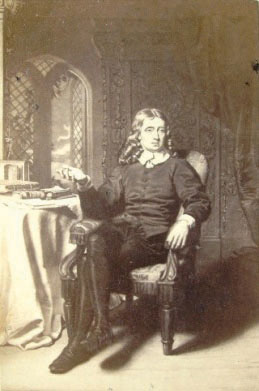
Referred to as the great Puritan poet, Milton found his fortunes went up and down with the rise and fall of Cromwell’s commonwealth. He accepted a government post as a translator under the commonwealth government, writing treatises supporting republicanism and Oliver Cromwell. During this period, Milton lost his vision and was forced to continue his writing by dictating to assistants, including poet Andrew Marvell. Following the Restoration, a warrant was issued for Milton’s arrest because of his support of Cromwell and the commonwealth government. Milton was arrested and imprisoned for a time until friends, again including poet Andrew Marvell, intervened and won his release, possibly saving Milton from execution. Milton retired to a small cottage in Chalfont St. Giles, where he continued to write until his death in 1674.
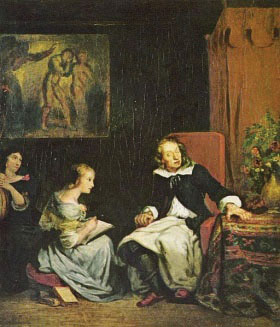
Milton Dictates to His Daughters Delacroix.
Video Clip 2
John Milton
(click to see video)
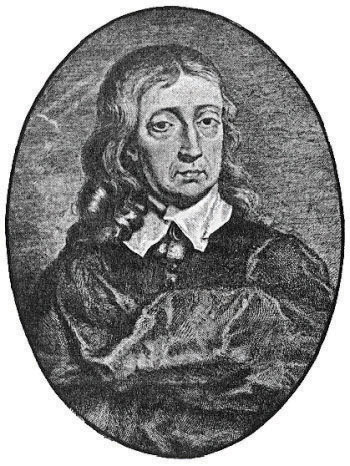
In 2008, Christ’s College, Cambridge created a Milton website as part of a celebration of Milton’s 400th birthday. It includes an abundance of information about Milton as well as an interactive study resource on Paradise Lost titled Darkness Visible .
Milton’s Literature
Milton wrote several types of literature :
- lyric poems
- longer poems such as “L’Allegro” and “Il Penseroso”
- his elegy Lycidas , written in memory of his friend Edward King
- his most famous work, the epic poem Paradise Lost
- a masque , a form of entertainment for the court involving singing and dancing as well as acting, usually with elaborate costumes and sets. The lords and ladies of the court sometimes took part in a masque as well as professional entertainers. Milton’s masque Comus , unlike the traditional masque, was not performed at court but in the castle of a nobleman. Its subject was the virtue of chastity rather than the more risqué subjects found in most masques.
- prose works on political and religious topics such as his Divorce Tracts and Areopagitica , a pamphlet arguing for freedom of the press
- “ Books by Milton, John .” Project Gutenberg .
- “ The John Milton Reading Room .” Thomas Luxon, Professor of English. Dartmouth College.
- “ Selected Poetry of John Milton (1608–1674) .” Representative Poetry Online . University of Toronto.
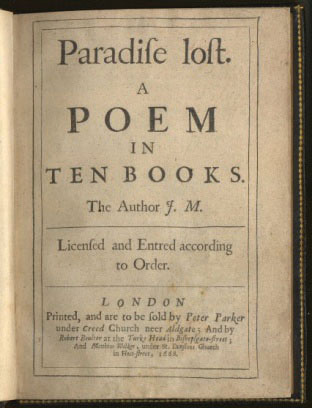
Paradise Lost Text
- Paradise Lost . Project Gutenberg .
- Paradise Lost . The 12-Book 1674 Edition. Michael E Bryson, Department of English. California State University, Northridge.
- Paradise Lost . “ The John Milton Reading Room .” Thomas Luxon, Professor of English. Dartmouth College.
- Paradise Lost (1667) . Judy Boss. Renascence Editions . text of 1667 edition with 10 books.
Paradise Lost
Milton had long contemplated writing an epic poem before he began Paradise Lost . He first thought of making the Arthurian legends its topic. Then he decided to write about the fall of man—”of man’s first disobedience.” Paradise Lost is considered the greatest epic written in the English language.
An epic is a long narrative poem in elevated style depicting the heroic adventures of a valiant, superhuman individual.
Examples of epics include
- Homer’s the Iliad and the Odyssey
- Virgil’s Aeneid
- The Song of Roland
- Milton’s Paradise Lost
Epics share the following characteristics:
- an epic hero: an historical or legendary individual capable of great deeds that are important to his/her people
- setting: a place of historical or legendary significance at a time crucial to the people of the story
- action: valiant feats requiring great courage and massive strength (physical or, sometimes, psychological)
- supernatural forces: mythological or supernatural figures that intervene in human events
style: an imposing, formal style that includes the use of literary and metrical techniques to convey a sense of eloquence and gravity, such as the caesura in Beowulf and in Paradise Lost
- enjambment —a sentence that continues from one line into another in a poem, continuing a thought over two or more lines rather than ending each sentence at the end of each line of poetry (end-stopped poetry)
- inversion —changing the normal word order of a sentence
- elision —omitting a letter or syllable of a word to maintain the meter of a line of poetry
In addition to these characteristics of epics, epics share a group of conventions , traditional features that are usually employed in a particular genre:
- a statement of theme at the beginning of the poem
- the invocation of a muse to inspire and instruct the poet
- a narrative opening in medias res (beginning a narrative in the middle of the action)
- catalogues (formal lists of items such as battleships or warriors)
- extended formal speeches by the main characters
- epic similes (similes several lines long and developed in great detail)
Key Takeaways
- Milton is known as the great Puritan poet.
- Milton wrote a variety of literature including lyric poetry, sonnets, long poems, a masque, an elegy, prose, and the great epic Paradise Lost .
- Paradise Lost displays the characteristics and conventions of the classical epic genre.
Identify the characteristics and conventions you find in Paradise Lost :
- epic hero: Literary scholars have not agreed on who the epic hero is in Paradise Lost —or if it has a hero. A clearly heroic figure such as Odysseus or Beowulf is not obvious in Paradise Lost . What reasons could you give for considering Satan, Christ, or Adam as the hero? What reasons would disqualify each character for that designation?
- setting: In what locations do the scenes in Paradise Lost take place? In Book I, describe the scene in which the action begins.
- action: What characters in Paradise Lost could be considered as taking heroic action? Some critics describe Satan as an anti-hero; why?
- supernatural forces: What supernatural forces take part in the action of Paradise Lost ?
- style: Describe the style of Paradise Lost . Find examples of literary techniques that add to the elevated, formal style of Paradise Lost such as enjambment, inversion, and elision.
- theme: Locate the introductory lines in which Milton states the theme of Paradise Lost .
- invocation to the muse: What is a muse? What muse does Milton invoke?
- in medias res : In the argument for Book I, Milton states that he plans to open in medias res . After the introductory lines, what is the scene when the action begins in Paradise Lost ?
- catalogues: A classical epic might provide a list of warriors in a great battle; what list of names does Milton provide in Book I of Paradise Lost ?
- extended formal speeches: Locate examples of formal speeches by Satan and Adam.
- epic similes: Locate examples of epic similes.
- “ John Milton (1608–74) .” John Milton 400th Anniversary Celebrations . Christ’s College, Cambridge University.
- “ John Milton & Seventeenth-Century Culture .” From the collections of Thomas Cooper Library based on an exhibit by Patrick Scott. University Libraries Rare Books & Special Collections. University of South Carolina.
- “ Life of John Milton (1608–1674) .” Anniina Jokinen. Luminarium .
- Open Milton . Open Knowledge Foundation .
- “ Selected Poetry of John Milton (1608–1674) .” Representative Poetry Online . Ian Lancashire. Department of English, University of Toronto. University of Toronto Libraries.
- Paradise Lost . The 12-Book 1674 Edition. Michael E. Bryson, Department of English. California State University, Northridge.
- Paradise Lost . The John Milton Reading Room . Thomas Luxon, Professor of English. Dartmouth College.
- “ The Lady Margaret Lectures 2008 .” Lecture podcasts. John Milton 400th Anniversary Celebrations . Christ’s College, Cambridge University.
- Paradise Lost . LibriVox .
- Paradise Lost . Podcasts of the Readings. John Milton 400th Anniversary Celebrations . Christ’s College, Cambridge University.
- Paradise Lost Audiotexts . John Rumrich. University of Texas.
- “ John Milton .” Dr. Carol Lowe. McLennan Community College.
- The Iconography of Paradise Lost . George Klawitter. St. Edwards University. Austin, Texas.
- “ Milton in the Old Library: 400th Anniversary Exhibit .” John Milton 400th Anniversary Celebrations . Christ’s College, Cambridge University. Images from a Cambridge University library exhibit, including images of first editions of Milton’s works and illustrations of Paradise Lost .
- Paradise Lost Illustrated . Don Ulin. University of Pittsburgh.
- “ The Paradise Lost of Milton with illustrations .” Designed and engraved by John Martin, 2 vols, 1827. Online Gallery: The Writer in the Garden. The British Library.
Additional Information
- Darkness Visible : A Resource for Studying Milton’s Paradise Lost . John Milton 400th Anniversary Celebrations . Christ’s College, Cambridge University. an interactive source including information on Paradise Lost , Milton’s biography, Milton’s views on religion and politics, influences Milton has had on subsequent literature, illustrations of Paradise Lost , Milton’s language, and critical information.
- “ History of the Masque Genre .” John Milton’s A Maske or Comus . Helen L. Hull, Meg F. Pearson, and Erin A. Sadlack. University of Maryland, College Park.
- “ John Milton’s Areopigitica .” Taking Liberties: The Struggle for Britain’s Freedoms and Rights. The British Library.
- “ Milton’s Works .” John Milton 400th Anniversary Celebrations . Christ’s College, Cambridge University. Lists of Milton’s works alphabetically and chronologically.
- The Poetry of John Milton . Dr. John Rogers, Yale. Open Yale video course. 24 video lectures. Academic Earth .

- Flannagan, Roy C. " Chronology ". Paradise Lost . Macmillan, 1992.
- Parker, William Riley. Milton: A Biography . vol 1. Oxford: Clarendon Press, 1996. 288.
- Masson, David. "A Brief Life of Milton." Encyclopaedia Britannica , 9th ed, 1888. Excerpted in: Milton, John. Paradise Lost . Scott Elledge, ed. New York, W. W. Norton & Company, 1993. 329-330.
- Parker. 345.
- Masson. 346.
- John Toland in 1698, quoted in Exploring Poetry , The Gale Group, 2006.
Jokinen, Anniina. "Life of John Milton." Luminarium . 21 June 2006. [Date you accessed this article]. http://www.luminarium.org/sevenlit/milton/miltonbio.htm >
- World Biography
John Milton Biography
Born: December 9, 1608 London, England Died: November 8, 1674 London, England English poet and essayist
The English poet John Milton was a champion of liberty. As a Protestant, he believed that the individual reader should interpret the Bible. He is chiefly famous for his epic (a long poem centered around a legendary hero) poem Paradise Lost and for his defense of uncensored (not checked for materials that may be harmful) publication.
Background and education
John Milton was born on December 9, 1608, in London, England. The future poet's father, John Milton, Sr., was a scrivener (a person who draws up deeds and wills). About 1600 he married Sara Jeffrey, the wealthy daughter of a merchant-tailor. Three of their children survived infancy: Anne, John, and Christopher.
The young Milton was known for his devotion to his studies, and his early interest in poetry. From his father, who was an amateur composer (a writer of music), young John developed the love of music, which later spread through his poetry. After private tutoring, he entered St. Paul's School in about 1620. Admitted to Christ's College at the age of fifteen, he intended to become a priest in the Church of England. Because of a disagreement with his tutor, he was rusticated (temporarily expelled) in 1626. Back at Cambridge about April 1626, Milton was assigned a different tutor and resumed the study of logic, ethics, Greek, Latin, and Hebrew. He composed Latin poems and epigrams (short poems dealing pointedly with a single thought or event and often ending with a clever turn of thought).
In 1628 Milton wrote his first major English poem, On the Death of a Fair Infant, Dying of the Cough, about the death of his sister's baby. A year later he wrote On the Morning of Christ's Nativity, celebrating the harmonizing power of divine love.
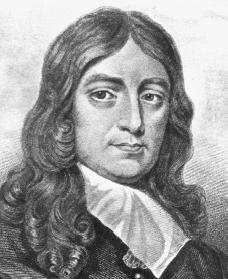
The graceful thirties
After receiving bachelor of arts and master of arts degrees in 1629 and 1632, Milton lived in his family's suburban home in Hammersmith, England, and then at their country estate in Horton, Buckinghamshire, England. He continued studies in theology, history, mathematics, and literature, and participated in social and cultural life in London and the country. At this time he wrote sonnets, lyrics, and A Mask (better known as Comus; a mixture of song, dance, pageantry and poetry).
Milton's themes were both particular and universal. In Lycidas (1637) he deals with why God allows the good to die young. In 1639, when he learned that a friend had died, he penned a moving Latin elegy (poetry for the dead), finding solace in Christian hope. By this time Milton had abandoned the idea of entering the ministry. He was, however, dedicated to making the Church of England more Protestant (non-Catholic).
In 1638 and 1639 Milton toured France and Italy. His good looks, enthusiasm, and his ability to speak many languages helped him to enter polite society abroad. He intended also to go to Greece, but news of the growing political and religious crisis in England led him to return to London.
Crucial decades, 1640–1660
It was by writing prose that Milton found opportunity to serve his God and country. There was a civil war in England that lasted from 1642 to 1648. King Charles I (1600–1649), who was Catholic, was opposed by a large number of his subjects, who were Puritan Protestants. King Charles was defeated and executed. In 1641 and 1642 Milton poured out tracts (leaflets) opposing the control over religion held by the Catholic bishops. He felt their powers were based on man-made traditions, self-interest, and a combination of ignorance, superstition, and deliberate lies.
In 1644 Milton's Of Education dealt with another kind of domestic freedom: how to develop discipline, reasonableness, broad culture, all-round ability, and independence of judgment in schoolboys. The same year saw Areopagitica, his defense of man's right to free speech and discussion as the best means of advancing truth. As the civil war ended, Milton turned to condemning royal tyranny (the abuse of power). The Tenure of Kings and Magistrates (1649) argued that men have a natural right to freedom and that contracts they make with rulers are voluntary and can be ended. Soon after its publication Milton began a decade as the revolutionary government's secretary for foreign tongues. His chief duty was to translate state letters into Latin. For some years, however, Milton had been losing his eyesight, and by early 1652 he was totally blind.
Milton had married Mary Powell in May 1642. In 1656, four years after his first wife's death, Milton married Kathrine Woodcock. Two years later she died after giving birth to a child, and he tenderly memorialized her in a sonnet, To my late departed Saint. In 1663 he married Elizabeth Minshell.
Milton heroically persisted despite his misfortunes. During the crisis preceding restoration of the monarchy he wrote several tracts. In A Treatise of Civil Power (1659) he again urged toleration and separation of Church and state. Ready and Easy Way (1660) argued for preservation of a republic, a government in which citizens hold power and vote to elect officials as their representatives in the government.
Triumph in defeat
When Charles II, son of the executed Charles I, regained the throne in 1660, Milton was in danger for supporting the overthrow of the monarchy. Milton was harassed and imprisoned and several of his books were burned. However, he was included in a general pardon.
Paradise Lost, the epic published in 1667, is inspired by the Bible story of the Creation, the fall of Adam and Eve, the rebellion of Satan against God, and Satan being cast out from heaven. In it Milton tried to convey some insight into God's wisdom and providence, but he did not intend it to be taken literally. Paradise Lost is generally regarded as the greatest epic poem in the English language. In 1671 its sequel, Paradise Regained, appeared in one volume with Samson Agonistes. Paradise Regained treats the rejection by Jesus of Satan's temptations. Its central point is that the true hero conquers not by force but by humility and faith in God. Samson Agonistes deals with the theme of temptation, dramatizing how the Hebrew strong man yielded to passion and seeming self-interest.
In 1673 Milton reentered public controversy (open to dispute) with Of True Religion, a brief defense of Protestantism. Before his death he was planning to publish writings that appeared posthumously (after death): his Latin state papers (1676) and a short history of Moscovia (1682). In 1694 his nephew Edward Phillips published a life of his uncle with an English translation of the state papers.
In the early nineteenth century the Latin manuscript of Milton's Christian Doctrine was discovered and translated (1825). In it he systematically set out to free the Scriptures from misinterpretation by discovering what the Bible itself said on such matters as fate, angels, and faith.
Reputation and influence
Milton influenced many writers. Some, like John Dryden (1631–1700), admired his work and used it as the basis for their own writing. Others, including Alexander Pope (1688–1744), poked fun at it. Still others, such as Samuel Johnson (1709–1784), admitted the worth of Milton's work but disagreed with his religious and political views.
In general, eighteenth-century poets praised him for possessing outstanding spiritual, intellectual, and moral worth. William Blake (1757–1827) and Percy Bysshe Shelley (1792–1822) praised his Satan as a romantic rebel. Samuel Taylor Coleridge (1772–1834) praised Milton's artistry and depth. In the 1920s, T. S. Eliot (1888–1965) criticized Milton's verse chiefly because of its influence. However, since about 1930, Milton has again been highly respected for his work.
John Milton died in London on November 8, 1674.
For More Information
Lewalski, Barbara Kiefer. John Milton: A Critical Biography. Malden, MA: Blackwell Publishers, 2001.
Parker, William Riley. Milton: A Biography. 2 vols. Oxford, England: Clarendon Press, 1968.
Shawcross, John T. John Milton: The Self and the World. Lexington: University Press of Kentucky, 1993.
Wilson, A. N. The Life of John Milton. New York: Oxford University Press, 1983.
User Contributions:
Comment about this article, ask questions, or add new information about this topic:.
English History
John Milton
- Born: December 9, 1608, London, England
- Died: November 8, 1674 (aged 65), London, England
- Notable Works: Paradise Lost (1667), Areopagitica (1644)
John Milton (9 December 1608 – 8 November 1674) was an English poet and intellectual. He served as a civil servant for the Commonwealth of England under its Council of State and later under Oliver Cromwell , and was also known for his poetry and writings that often tackled political issues in a time of religious and political instability.
The phases of Milton’s life parallel the major historical and political divisions in Stuart Britain. He had radical views which gave him a public platform, developed from his very extensive reading, as well as travel and experience, from his student days of the 1620s to the English Civil War .
While his poetry was written mostly for private circulation, he launched a career as pamphleteer and publicist under the increasingly personal rule of Charles I , and even was appointed Secretary for Foreign Tongues by the Council of State.
His poetry was slow to see the light of day, at least under his name, with his first poem “On Shakespeare” (1630), anonymously included in the Second Folio edition of William Shakespeare’s plays in 1632. However, his epic poem Paradise Lost (1667), has remained popular and helped to solidify his reputation as one of the greatest English poets of his time.
Milton later became blind and by 1660 was deprived of his public platform, although this allowed him time to write his poems. He died from consumption at the age of 65.
John Milton – Early Life
John Milton was born in Bread Street, London on 9 December 1608, to composer John Milton and his wife Sarah Jeffrey. The senior John Milton had moved to London around 1583 after being disinherited by his devout Catholic father Richard “the Ranger” Milton for embracing Protestantism. There, he married Sarah Jeffrey, and was noted for his skill as a musical composer, which had a big impact on his son.
Other children of John and Sara who survived infancy included Anne, their oldest child, and Christopher, seven years younger than John. At least three others died shortly after birth, in infancy or in early childhood.
From 1618 to 1620, Milton was tutored in the family home. One of his tutors was Thomas Young, who became chaplain to the English merchants in Hamburg during the 1620s. Although he departed England when Milton was approximately eleven years old, Young’s impression on the young pupil was long standing.
Following his tutoring by young, Milton attended St. Paul’s School from 1620 until 1625. There he began the study of Latin and Greek, both classical languages than heavily influenced Milton in his writing. During his years at St. Paul’s, Milton befriended Charles Diodati, who became his closest companion in boyhood and to whom he wrote “Elegia prima” (Elegy I) and “Elegia sexta” (Elegy VI).
In 1625, Milton began attending Christ’s College, Cambridge. He graduated with a B.A. in 1629, ranking fourth of 24 honours graduates that year in the University of Cambridge. Preparing to become an Anglican priest, Milton stayed on and obtained his Master of Arts degree on 3 July 1632. Milton experienced alienation from his peers and university life as a whole, despite the fact he was a good poet and an eager learner.
With his first tutor at Cambridge, the logician William Chappell, Milton had some sort of disagreement, after which he may have been whipped. Thereafter, in the Lent term of 1626, Milton was rusticated or suspended, a circumstance to which he refers in “Elegia prima.” After his return to Cambridge later that year and for the remainder of his years there, he was tutored by Nathaniel Tovey.
By the time he had obtained his Masters degree, Milton had already written a substantial amount of poetry. These included a number of his well-known shorter English poems, among them “On the Morning of Christ’s Nativity”, his “Epitaph on the admirable Dramaticke Poet, W. Shakespeare ” (his first poem to appear in print), L’Allegro, and Il Penseroso.
Private Study
Having received his M.A., Milton retired to Hammersmith, which was his father’s new home, where he spent the years of 1632 to 1635, before moving to Horton, Berkshire, in 1635 until 1638. He dedicated these six years to self-directed private study. He read both ancient and modern works of theology, philosophy, history, politics, literature and science in preparation for a prospective poetical career.
Thanks to all this reading, Milton is considered to be among the most learned of all English poets. What’s more, he was also able to read in multiple languages, including Latin, Greek, Hebrew, French, Spanish and Italian.
It is thought Milton may have returned home during this time because he was caring for his parents in their old age because his sister and brother were unable to do so. Anne had become a widow in 1631 and had two young children. Around 1632, she married Thomas Agar, a widower who had one young child. Milton’s younger brother, Christopher, was a student at Christ’s College. The situation with his parents may explain why Milton, after Cambridge, did not accept or seek a preferment in the church.
During this time of private study, Milton continued to write poetry. His Arcades and Comus were both commissioned for masques composed for noble patrons, connections of the Egerton family, and performed in 1632 and 1634 respectively. He contributed his pastoral elegy Lycidas to a memorial collection for one of his fellow-students at Cambridge.
In May 1638, Milton embarked upon a tour of France and Italy that lasted until July or August 1639. This travel supplemented his study with new and direct experience of artistic and religious traditions, especially Roman Catholicism, and he also met famous theorists and intellectuals of the time, and was able to display his poetic skills.
Milton started his travels in Calais before moving to Paris. He travelled on horseback, delivering a letter from diplomat Henry Wotton to ambassador John Scudamore. Through Scudamore, Milton met Hugo Grotius, a Dutch law philosopher, playwright and poet.
Milton left France soon after this meeting and travelled south from Nice to Genoa, and then to Livorno and Pisa. He reached Florence in July 1638 and met the astronomer Galileo who was under house arrest at Arcetri.
In September, he moved on to Rome, where he was able to impress Giovanni Salzilli with his poetic skills. In late October, Milton attended a dinner given by the English College, Rome, despite his dislike for the Society of Jesus , meeting English Catholics who were also guests, such as the theologian Henry Holden and the poet Patrick Cary. He also attended musical events, including oratorios, operas and melodramas.
Milton left for Naples toward the end of November, where he stayed only for a month because of the Spanish control. He travelled to Geneva, then again to Florence and then to Venice, before travelling back to Geneva. Either in Venice or Geneva, Milton received word that his sister, Anne, and his childhood friend Diodati had died. Because of what he called “sad tidings of civil war in England” in Defensio Secunda, he returned to England during the summer of 1639.

Post Travel
Upon returning to England, Milton assisted in the education and upbringing of Anne’s children, John and Edward Phillips. The Bishops’ Wars were happening during this time, and he also became embroiled in the controversies against the Church of England and the growing absolutism of Charles I. He began writing prose tracts against episcopacy and vigorously attacked the High-church party of the Church of England and their leader William Laud , Archbishop of Canterbury, with frequent passages of real eloquence lighting up the rough controversial style of the period, and deploying a wide knowledge of church history.
In June 1642, Milton married Mary Powell from Forest Hill, Oxfordshire. She was only 16 at the time, and found it difficult to live with Milton while he was a schoolmaster and writer, who was also almost twenty years her senior. Therefore, she returned home to her family and this separation evidently motivated the composition of The Doctrine and Discipline of Divorce (1643).
Milton wrote this during a period when thoughts about divorce were anything but simplistic, and argued that divorce was a private matter, not a legal or ecclesiastical one. Milton’s basic approval of divorce within strict parameters set by the biblical witness was typical of many influential Christian intellectuals, particularly the Westminster divines. Milton addressed the Assembly on the matter of divorce in August 1643, at a moment when the Assembly was beginning to form its opinion on the matter.
The Doctrine and Discipline of Divorce was accompanied by The Judgment of Martin Bucer, Tetrachordon and Colasterion, all who were written by Milton in the period during which Mary left him. These pamphlets all caused some controversy, which led Milton to write Areopagitica; A speech of Mr. John Milton for the Liberty of Unlicenc’d Printing, to the Parlament of England, which was his celebrated attack on pre-printing censorship. In Areopagitica, Milton aligns himself with the parliamentary cause, and he also begins to synthesise the ideal of neo-Roman liberty with that of Christian liberty.
Mary did not return to live with Milton until 1645, partly because of the outbreak of the Civil War.
Secretary for Foreign Tongues
After the parliamentary victory in the Civil War, Milton wrote The Tenure of Kings and Magistrates (1649) in defence of the republican principles represented by the Commonwealth. It defended the right of the people to hold their rulers to account and implicitly sanctioned the regicide.
In March 1649, Milton’s political reputation got him appointed Secretary for Foreign Tongues by the Council of State. His main job description was to compose the English Republic’s foreign correspondence in Latin and other languages, but he also was called upon to produce propaganda for the regime and to serve as a censor.
In October 1649, he published Eikonoklastes in response to the Eikon Basilike that portrayed the King as an innocent Christian martyr. Milton tried to break this powerful image of Charles I, however, a month later, the exiled Charles II and his party published the defence of monarchy Defensio Regia pro Carolo Primo, written by leading humanist Claudius Salmasius. By January of the following year, Milton was ordered to write a defence of the English people by the Council of State.
This was published in February 1652 and was entitled Defensio pro Populo Anglicano, also known as the First Defence. It gave Milton a European reputation and numerous editions were released.
In 1654, Milton completed the second defence of the English nation Defensio secunda in response to an anonymous Royalist tract “Regii Sanguinis Clamor ad Coelum Adversus Parricidas Anglicanos”, which was a work that made many personal attacks on Milton. Milton’s second defence praised Oliver Cromwell , who was now Lord Protector, while exhorting him to remain true to the principles of the Revolution.
Milton remained as the Secretary for Foreign Tongues until 1660, by which time he was completely blind. This was likely due to retinal detachment or glaucoma, and forced him to dictate his verse and prose to amanuenses who copied them out for him.
The Restoration and Final Years
When Oliver Cromwell died in 1658, the English Republic collapsed into feuding military and political factions, yet Milton clung to the beliefs that had originally inspired him to write for the Commonwealth. He continued to write, attacking the concept of a state-dominated church, and published several proposals to retain a non-monarchical government against the wishes of parliament, soldiers, and the people.
When the Restoration took place in May 1660 and King Charles II returned from exile in Europe, Milton went into hiding for fear of his life. A warrant was issued for his arrest and his writings were burnt. He re-emerged after a general pardon was issued, but was nevertheless arrested and briefly imprisoned.
He spent the last decade of his life living quietly in London. Milton retired to a cottage in Chalfont St. Giles during the Great Plague of London and, during this period, published several minor prose works, such as the grammar textbook Art of Logic and a History of Britain.
Milton died on 8 November 1674 of consumption and was buried in the church of St Giles-without-Cripplegate, Fore Street, London. A monument was added in 1793, sculpted by John Bacon the Elder.
Paradise Lost
Paradise Lost is arguably Milton’s most famous work. He composed it from 1658 to 1664 (first edition), with small but significant revisions published in 1674 (second edition). He was blind and impoverished when he created it, dictating it to series of aides.
The epic poem in blank verse consists of ten books with over ten thousand lines of verse. The poem concerns the biblical story of the Fall of Man: the temptation of Adam and Eve by the fallen angel Satan and their expulsion from the Garden of Eden.
On 27 April 1667, Milton sold the publication rights for Paradise Lost to publisher Samuel Simmons for £5 (equivalent to approximately £1000 in today’s purchasing power), with a further £5 to be paid if and when each print run sold out of between 1,300 and 1,500 copies. The first run was a quarto edition priced at three shillings per copy (about £30 today), published in August 1667, and it sold out in eighteen months.
The sequel to Paradise Lost, Paradise Regained, was published alongside the tragedy Samson Agonistes in 1671. Both of these works also reflect Milton’s post-Restoration political situation.
Marriages and Family
Milton and his first wife Mary had four children, Anne (born 29 July 1646), Mary (born 25 October 1648), John (16 March 1651 – June 1652) and Deborah (2 May 1652 – 10 August 1727). Mary died on 5 May 1652 from complications following Deborah’s birth. Milton’s daughters survived to adulthood, but he always had a strained relationship with them because they did not inherit their father’s interest in and aptitude for learning.
Milton remarried and his second wife, Katherine Woodcock, whom he married on 12 November 1656, died in 1658. She died less than four months after giving birth to her daughter Katherine, who also died.
Milton married for a third time. He married Elizabeth Minshull on 24 February 1663, who was 30 years younger than him. She survived him and lived until 1728. Their marriage was happy and lasted until his death in 1674.
Historical Significance
Following the publication of Paradise Lost, Milton immediately became an epic poet and was praised by many. He was celebrated by John Dryden , Alexander Pope , Joseph Addison, Thomas Newton and Samuel Johnson, as well as William Blake , who considered him to be the major English poet .
Romantic poets such as William Wordsworth and John Keats found inspiration in Milton, as well as George Eliot and Thomas Hardy from the Victorian Era . Milton’s use of blank verse, in addition to his stylistic innovations, influenced later poets. At the time, poetic blank verse was considered distinct from its use in verse drama, and Paradise Lost was taken as a unique examplar.
Milton is also remembered for his lack of rhyme and unconventional rhythm that really made him stand out from the crowd, and has been studied and admired by generations of poets that followed.
Poetry and drama
- 1629: On the Morning of Christ’s Nativity
- 1630: On Shakespeare
- 1631: On Arriving at the Age of Twenty-Three
- 1632: L’Allegro
- 1632: Il Penseroso
- 1634: A Mask Presented at Ludlow Castle, 1634, commonly known as Comus (a masque)
- 1637: Lycidas
- 1645: Poems of Mr John Milton, Both English and Latin
- 1652: When I Consider How My Light is Spent
- 1655: On the Late Massacre in Piedmont
- 1667: Paradise Lost
- 1671: Paradise Regained
- 1671: Samson Agonistes
- 1673: Poems, &c, Upon Several Occasions
- Arcades: a masque (date is unknown)
- Of Reformation (1641)
- Of Prelatical Episcopacy (1641)
- Animadversions (1641)
- The Reason of Church-Government Urged against Prelaty (1642)
- Apology for Smectymnuus (1642)
- Doctrine and Discipline of Divorce (1643)
- Judgement of Martin Bucer Concerning Divorce (1644)
- Of Education (1644)
- Areopagitica (1644)
- Tetrachordon (1645)
- Colasterion (1645)
- The Tenure of Kings and Magistrates (1649)
- Eikonoklastes (1649)
- Defensio pro Populo Anglicano [First Defence] (1651)
- Defensio Secunda [Second Defence] (1654)
- A Treatise of Civil Power (1659)
- The Likeliest Means to Remove Hirelings from the Church (1659)
- The Ready and Easy Way to Establish a Free Commonwealth (1660)
- Brief Notes Upon a Late Sermon (1660)
- Accedence Commenced Grammar (1669)
- The History of Britain (1670)
- Artis logicae plenior institutio [Art of Logic] (1672)
- Of True Religion (1673)
- Epistolae Familiaries (1674)
- Prolusiones (1674)
- De Doctrina Christiana (1823)
Link/cite this page
If you use any of the content on this page in your own work, please use the code below to cite this page as the source of the content.
Link will appear as Hanson, Marilee. "John Milton" https://englishhistory.net/poets/john-milton/ , November 18, 2021
World History Edu
- Renowned Writers
John Milton: Biography, Paradise Lost & Other Famous Works
by World History Edu · September 11, 2022

John Milton – Life, Works and Accomplishments
John Milton, a 17th-century English poet and historian, produced many notable works that had profound influence on not just the English writers but also the English language itself.
Much of his work represented his political and religious point of view. Between 1632 and 1674, he wrote a number of poetry and prose which include the famed, “Paradise Lost,” “Paradise Regained” and “L’Allegro.”
World History Edu presents everything that you need to know about John Milton, a gifted poet and thinker who was described by English writer William Hayley as the greatest English poet of all time.
Early Years
The eldest son of John Milton Sr., a composer and copyist, and his wife Sarah, this English poet was born in London on December 9, 1608.
Milton’s grandfather cut out his father from his will because his father had converted from Catholicism to Protestantism. His father was a known musical composer in London. And Milton had a great appreciation of his father’s musical prowess.

Blue plaque in Bread Street, London to mark John Milton’s place of birth
Milton received private tuition from Thomas Young at an early age. Later, he studied Greek and classical Latin at the reputable St. Paul’s school.
His earliest compositions were a couple of odes, including the Christmas ode “On the Morning of Christ’s Nativity”, which he wrote in his mid-teens.
Desiring to be a priest, John Milton enrolled in Christ’s College, Cambridge in 1625. Four years later, he earned his B.A. and in 1632 received his M.A.

Growing up, he was privately tutored by Thomas Young, a Scottish Presbyterian minister and theologian. Image: John Milton at age 10 by Cornelis Janssens van Ceulen. In Milton’s Cottage, Chalfont St Giles.
Milton abandoned priesthood and pursued a literary career. He wrote one of his famous books “Comus, a Masque” around this period.
Following the death of his mother and friend in 1637, he penned his pastoral elegy “Lycidas,” which overtime became one of the most renowned English elegiac poems. His poem Lycidas was written for his friend Edward King.
Politically Motivated Works & Philosophy
John Milton’s career as a prose and poetry writer covered three unique eras. His main “polemical” prose was written in the 1640s and 1650s, during the disagreement between the Church of England and the many reformist sects, including Puritans; and between the monarch and Parliament.
In March 1649, Milton became secretary for foreign tongues to the Council of State. His duty to the government, especially regarding foreign policy, is recorded by official correspondence, the Letters of State amongst others. Milton continued to write After Charles II was crowned.
While his impact as a prose writer was great, his poetry was even greater. He described his prose works as the accomplishments of his “left hand.” Like many of his prolific literary contemporaries whose works bear much resemblance to his, Milton took advantage of his poetry to speak on matters bordering on religion and politics. He did the same with many of his prose.
Putting himself in the same category of poets and writers whose works are ways and channels for expressing their voice and sentiments, he also employed the pastoral poem to represent his outlook on politics. By so doing, Milton worked towards fostering a civilized commonwealth, just like the polis of Greek antiquity or the cultured city-states in Italy during the artistic, political and cultural rebirth.
The year 1645 saw him publish his first collection of poetry, Poems of Mr. John Milton, Both English and Latin , much of which he wrote before he turned twenty years of age. The collection painted him as a rising poet, one who was armed with a plan and demonstrated his growth in various ways, including an excellent command over such ancient and modern languages as Greek, Latin, Hebrew, and Italian.
Through his works, he created awareness of various traditions in literature. His poems in the 1645 edition comprised various genres such as paraphrase, sonnet, masque, pastoral elegy, verse letter, English ode, epigram, obituary poem, and companion poem.
Support for republican views and the “Good Old Cause”
Milton shared the Republican ideologies and argued in favor of the regicide of King Charles I of England in many of his books. He also expressed his support for the government of England in his 1652 book, Defensio pro Populo Anglicano .
Some of his works were also aimed at William Laud, Archbishop of Canterbury during the First English Civil War.
Two years later, he issued a pro-Oliver Cromwell book in response to a Royalist’s article. Cromwell was the first Lord Protector of the Commonwealth of England, Scotland and Ireland.
His work The Tenure of Kings and Magistrates in 1649 gave support to defending people’s liberties and was against the absolute power kings enjoyed.
In keeping up with his support of nonmonarchical government, his work Eikonoklastes supported the regicide of King Charles I and attacked Royalist tracts and works.
Views on divorce
Milton wrote some works that argued for divorce to be permitted beyond the grounds of infidelity. This view of his was likely influenced by the rocky relationship he had with his first wife Mary Powell. The author tied the knot with Powell, who was about 17 years younger than him. Milton, a republican-leaning author and thinker, is said to have gotten frustrated by Powell’s royalist views.
Paradise Lost
Milton went on to produce more prose and poetry. He completed a very important work, Paradise Lost , an epic poem that tells the Biblical story of how mankind’s fell and lost favor with God. It recaptures the period Adam and Eve fell prey to the temptation of Satan and ate the fruit on the Tree of Knowledge leading to their banishment from the Garden of Eden.
The poem, regarded by most as Milton’s masterpiece, is written in blank verse and contains 12 books. An ambitious work, it has strongly appealed to generations for more than 350 years and its influence has spilled over to also every inch of the Western world.
Other Famous Works
- John Milton’s works had profound influence on the English language and English writers, including William Wordsworth and William Blake.
Here are few more notable works by John Milton:
Paradise Regained
First published in 1671, Milton in this poem tells the story of Satan’s tests on Jesus and details a philosophical dialogue between Satan and the son of God. Jesus, unmoved by the devil’s deception, passes the test.
L’Allegro and II Penseroso
These “companion poems” celebrate the of the rural landscapes and the “busyness” of life in the cities. Milton wrote this poem in his twenties.
Methought I Saw My Late Espoused Saint
This poem was woven around the death of a wife. Many believed the subject to be Katherine Woodcock, who after having their baby died. Sadly, the baby died too.
On the Late Massacre in Piedmont
Milton described the terrible 1655 killings of the Waldensians in Piedmont by Charles Emanuel II in this poem.
How Soon Hath Time
Milton penned this sonnet at age 23. Though he has made a mark at Cambridge University, he felt he was disconnected from and left behind by his peers while he himself walked a lone path towards a great life. This poem expresses his consciousness of mortality and the passing of time.
On Shakespeare
His first published poem, this poem is an eulogy Milton wrote about the life and works of William Shakespeare.
Style and Legacy

“Paradise Lost” wasn’t the only work that he was most renowned for. His 1664 prose polemic “Areopagitica” also brought him wide acclaim. The work strongly defends the rights of individuals and other civil liberties. Image: Title page of the 1644 edition of Areopagitica
Milton’s way of writing was distinctive, leaning towards a deeply philosophical style. His major technique in “Paradise Lost” and “Paradise regained” were visibly impacted by the language of the Bible particularly, by the book of Palms and Revelation.
Milton’s subjects would greatly influence future generations of poets. Based on his book, “Order and Disorder,” the English translator and poet, Lady Hutchison, published a piece on the subject of good and evil.
John Milton: Fast Facts
Born : December 9, 1608
Place of Birth : Bread Street, Cheapside, London, England
Died : November 8, 1674
Place of death : Bunhill, London, England
Parent: John Milton Sr. and Sarah Jeffrey
Spouses : Mary Powell (1642-1652), Katherine Woodcock (1656-1658), and Elizabeth (married in 1663)
Children : 5
Most famous poems : Paradise Lost , Samson Agonistes , and Lycidas
Did you know?

He penned works such as L’Allegro, On the Morning of Christ’s Nativity, and Il Penseros while studying at Christ’s College, Cambridge. Engraving by William Faithorne, 1670
- The gifted English poet could write in other languages, including Italian, Spanish, Greek, and Latin
- “Paradise Lost” wasn’t the only work that he was most renowned for. His 1664 prose polemic “Areopagitica” also brought him wide acclaim. The work strongly defends the rights of individuals and other civil liberties.
- English writer William Hayley described Milton as the greatest English poet of all time.
- Elegia Prima , written around 1626, was his first Latin elegy. The elegy was written to Charles Diodati, a close friend of his.
- A good number of his works and political views were influenced by the books he read as well as the travel experience he chalked up. Milton toured Europe, travelling to Greece, Geneva, Venice, France and Italy. His travels allowed him to interacted with many scholars and intellectuals, including Hugo Grotius, a Dutch philosopher and poet; Henry Holden, English Roman Catholic priest and theologian; and Lukas Holste, a Vatican scholar and librarian.
- Many of his notable works came when he was completely blind. For example, his critically acclaimed work Paradise Lost , which was written between 1658 and 1664, was dictated to his aides. It’s been stated that the poet most likely suffered from Glaucoma.
- The poet was well-read on ancient and modern works of philosophy, history, literature, science and theology. As a result, many consider him as probably the most learned English poet.
Tags: English poets John Milton Poets
You may also like...
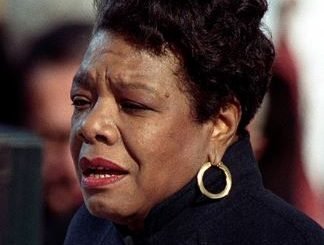
20 Surprising Facts about Maya Angelou
July 7, 2020
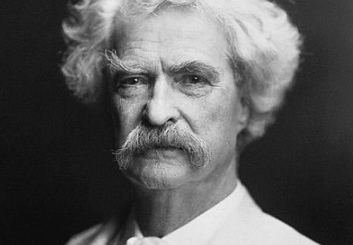
Mark Twain: Biography, Achievements, Major Works, & Facts
October 6, 2021

George R.R. Martin: Biography & Major Accomplishments
July 23, 2023
Leave a Reply Cancel reply
Your email address will not be published. Required fields are marked *
Save my name, email, and website in this browser for the next time I comment.
- Next story Charles II of England: History, Family, Reign & Achievements
- Previous story Charles Best and Frederick Banting: The Scientists Who Discovered Insulin
- Popular Posts
- Recent Posts

What transpired at the Battle of Edington in 878? – History & Major Facts

History of the Philippines and its most popular tourist attractions

Bonghwang in Korean Mythology

Why was King Tut’s tomb so well preserved?

The story of King Canute and the tide

Greatest African Leaders of all Time

Queen Elizabeth II: 10 Major Achievements

Donald Trump’s Educational Background

Donald Trump: 10 Most Significant Achievements

8 Most Important Achievements of John F. Kennedy

Odin in Norse Mythology: Origin Story, Meaning and Symbols

Ragnar Lothbrok – History, Facts & Legendary Achievements

9 Great Achievements of Queen Victoria

12 Most Influential Presidents of the United States

Most Ruthless African Dictators of All Time

Kwame Nkrumah: History, Major Facts & 10 Memorable Achievements

Greek God Hermes: Myths, Powers and Early Portrayals

8 Major Achievements of Rosa Parks

How did Captain James Cook die?

10 Most Famous Pharaohs of Egypt

Kamala Harris: 10 Major Achievements

The Exact Relationship between Elizabeth II and Elizabeth I

Poseidon: Myths and Facts about the Greek God of the Sea

Nile River: Location, Importance & Major Facts

Importance and Major Facts about Magna Carta
- Adolf Hitler Alexander the Great American Civil War Ancient Egyptian gods Ancient Egyptian religion Aphrodite Apollo Athena Athens Black history Carthage China Civil Rights Movement Constantine the Great Constantinople Egypt England France Germany Ghana Hera Horus India Isis John Adams Julius Caesar Loki Military Generals Military History Nobel Peace Prize Odin Osiris Pan-Africanism Queen Elizabeth I Ra Ragnarök Religion Set (Seth) Soviet Union Thor Timeline Women’s History World War I World War II Zeus

John Milton: A Biography
John milton 1608-1674.
English is often referred to as ‘the language of Shakespeare and Milton.’ Milton’s poetry has been seen as the most perfect poetic expression in the English language for four centuries.
His most famous poem, the epic Paradise Lost is a high point of English epic poetry. Its story has entered into English and European culture to such an extent that the details of our ideas of heaven and hell and paradise, Adam and Eve, Satan and his legions’ war against God, the arch angel Gabriel and all of those Genesis characters and events, come from Milton’s imagining of them in this poem.
Although so many of our ideas about that story come from Paradise Lost Milton is not read much these days. He is still studied in universities that wish to give their students a grounding in classic English poetry, however.
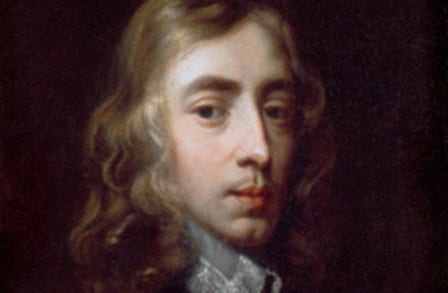
John Milton portrait
Paradise Lost has all the elements of Greek epic poetry, such as extended metaphors; a hero with cosmic significance (Satan); a setting that encompasses the whole world or, in this case, the universe; battle deeds that go beyond normal acts of warfare; the intervention of supernatural beings in the affairs of humans; and language that is suited to the elevated events and the characters of the epic. Itg is this last characteristic that most distances the modern reader from Milton’s poetry. This extract shows how far distant the poetry is from the modern taste:
The Angel ended, and in Adams Eare So Charming left his voice, that he a while Thought him still speaking, still stood fixt to hear; Then as new wak’t thus gratefully repli’d. What thanks sufficient, or what recompence Equal have I to render thee, Divine Hystorian, who thus largely hast allayd The thirst I had of knowledge, and voutsaf’t This friendly condescention to relate Things else by me unsearchable, now heard With wonder, but delight, and, as is due, With glorie attributed to the high Creator; something yet of doubt remaines, Which onely thy solution can resolve. When I behold this goodly Frame, this World Of Heav’n and Earth consisting, and compute, Thir magnitudes, this Earth a spot, a graine, An Atom, with the Firmament compar’d And all her numberd Starrs, that seem to rowle Spaces incomprehensible (for such Thir distance argues and thir swift return Diurnal) meerly to officiate light Round this opacous Earth, this punctual spot, One day and night; in all thir vast survey Useless besides, reasoning I oft admire, How Nature wise and frugal could commit Such disproportions, with superfluous hand So many nobler Bodies to create, Greater so manifold to this one use, For aught appeers, and on thir Orbs impose Such restless revolution day by day Repeated, while the sedentarie Earth, That better might with farr less compass move, Serv’d by more noble then her self, attaines Her end without least motion, and receaves, As Tribute such a sumless journey brought Of incorporeal speed, her warmth and light.
Milton was a man of letters, and a civil servant. He was politically active – a pamphleteer – a republican and supporter of Oliver Cromwell. Although by the time of his death Paradise Lost was already being spoken of as the greatest poem in the English language he died poor, as a result of his republican views and anti-monarchist involvement.
Read more about England’s top writers >> Read biographies of the 30 greatest writers ever >>
Interested in John Milton? If so you can get some additional free information by visiting our friends over at PoemAnalysis to read their analysis of Milton’s poetic works .
- Pinterest 0
Leave a Reply
Leave a reply cancel reply.
Your email address will not be published. Required fields are marked *
Save my name, email, and website in this browser for the next time I comment.

British Literature Wiki

John Milton
(1608-1674).
John Milton was a 17th century historian, journalist and poet born on December 9th, 1608 in London, England. He was best known for his writing of Paradise Lost. Milton first planned to become a priest. He studied at Cambridge University and afterwards decided to abandon this path to become a full time writer and poet. Milton became very active in politics, and often wrote political pamphlets along with his other writings. As a protestant who believed in freedom of worship, Milton was often at odds with the Roman Catholic Church, an organization strongly opposed to the protestants. Eventually, John Milton would work for the English government under Oliver Cromwell after the removal of the monarchy.
Milton married in 1643 to Mary Powell, but this marriage was deemed a disaster. During this time Milton began writing about divorce and the merits that came along with it. These works were denounced by Parliament and the marriage marked some of the harder times in his life. She would die in 1652 during childbirth of one of his four offspring with her. Not only would his only son also die that year, but he would also lose his vision. Milton continued constructing literature during this time, but instead of writing down his work he would dictate it while a colleague would write it down. Milton would marry twice more in his lifetime.
Many of his works have religious, political, and personal themes. For example, instances of imagery of light and darkness and good and evil can be found in several works, including the annotated examples given in the section below. Milton came to face his own battle with inevitable darkness as he began to lose his sight. In order to keep writing, he employed assistants. One of the most well known of his assistants is fellow writer Andrew Marvell . When the monarchy was restored in England in 1660, Milton was imprisoned, but later pardoned. He spent the rest of his life writing.
He passed away on November 8th, 1674 in London, England.
Annotated Examples of Milton’s Poetry:
On the late massacre in piedmont, methought i saw my late espoused saint, when i consider how my light is spent.
Formatting needs fixing here.
Title Page Paradise Lost . From Wikimedia Commons. https://sites.udel.edu/britlitwiki/files//2018/06/FileMilton_paradise.jpg
- http://www.biography.com/people/john-milton-940939
- http://www.notablebiographies.com/Ma-Mo/Milton-John.html#b
- http://www.luminarium.org/sevenlit/milton/miltonbio.htm
- http://knowledge4africa.com/english/poetry/on-his-blindness-c.jsp
- http://www.egs.edu/library/john-milton/biography/
Contributors: Amanda Stevens, John Young, Chris Spyres,
Local Histories
Tim's History of British Towns, Cities and So Much More
A Brief Biography of John Milton
By Tim Lambert
His Early Life
John Milton was a great English writer of the 17th Century. Milton was also a great believer in liberty. Milton was born in Bread Street in London on 9 December 1608. His father also called John was a scrivener (a man who wrote contracts and other legal documents). His mother was called Sarah. John Milton Senior also composed music. From an early age, John Milton Junior also loved music. From the age of 12, he was sent to St Paul’s school.
In 1625 Milton went to Cambridge University. He was awarded a BA in 1629 and an MA in 1632. After leaving university Milton continued studying at home. He also wrote poetry. In 1629 Milton wrote a poem called On the Morning of Christ’s Nativity. In 1634 a masque by John Milton called Comus was performed. (In the early 17th century a masque was a form of entertainment for the rich. It involved, drama, music, and dance). In 1638 a famous poem by Milton called Lycidas was published.
In 1638-39 Milton traveled to France and Italy and he met Galileo. In 1639 Milton returned to England he became a schoolteacher in London.
Milton the Writer
In 1642 civil war began between the king and parliament. John Milton was a strong supporter of freedom so naturally, he supported parliament. In 1642 Milton wrote pamphlets attacking episcopacy (the belief that the church should have bishops). In 1643 he wrote a pamphlet arguing that divorce should be allowed and in 1644 he wrote a pamphlet in favor of freedom of speech. Following the execution of King Charles I in 1649 John Milton wrote material supporting the Commonwealth (the republican government that ruled from 1649 to 1660). Milton also worked for the government translating documents into Latin.

Tragically in 1652, Milton went blind. However, in 1667 his great work Paradise Lost was first printed. It deals with the rebellion of Adam and Eve against God and their expulsion from the Garden of Eden. In 1671 another work by Milton, Paradise Regained was published. Meanwhile, Milton was married 3 times. John Milton died on 8 November 1674 aged 65. He was buried in St Giles Church in Cripplegate, London. Today he is remembered as the greatest English writer of the 17th century.
Share this:
- Click to share on Twitter (Opens in new window)
- Click to share on Facebook (Opens in new window)
- Click to share on LinkedIn (Opens in new window)
- Click to share on WhatsApp (Opens in new window)

IMAGES
COMMENTS
Milton's paternal grandfather, Richard, was a staunch Roman Catholic who expelled his son John, the poet's father, from the family home in Oxfordshire for reading an English (i.e., Protestant) Bible.Banished and disinherited, Milton's father established in London a business as a scrivener, preparing documents for legal transactions.He was also a moneylender, and he negotiated with ...
John Milton (9 December 1608 - 8 November 1674) was an English poet, polemicist, and civil servant.His 1667 epic poem Paradise Lost, written in blank verse and including twelve books, was written in a time of immense religious flux and political upheaval. It addressed the fall of man, including the temptation of Adam and Eve by the fallen angel Satan and God's expulsion of them from the ...
Learn about the life and works of John Milton, the English poet who wrote Paradise Lost, the greatest epic poem in English. Explore his political and religious views, his marriages, his blindness, and his legacy.
John Milton. 1608 -. 1674. Read poems by this poet. John Milton was born in London on December 9, 1608, into a middle-class family. He was educated at St. Paul's School, then at Christ's College, Cambridge, where he began to write poetry in Latin, Italian, and English, and prepared to enter the clergy. After university, however, he ...
Learn about the life and poetry of John Milton, one of the most influential and celebrated English writers. Explore his prose, political tracts, and epic poems, such as Paradise Lost, written during the turbulent times of Stuart England.
Learn about John Milton, the English poet and intellectual who wrote Paradise Lost and defended republicanism and religious tolerance. Explore his early life, education, travels, marriages, political activities, and blindness.
John Milton Biography Early Years. John Milton was born in London on December 9, 1608. His parents were John Milton, Sr. and Sarah Jeffery, who lived in a prosperous neighborhood of merchants. John Milton, Sr. was a successful scrivener or copyist who also dabbled in real estate and was noted as a composer of liturgical church music.
John Milton John Milton was born on Bread Street in central London (the street where Mary Godwin and Percy Bysshe Shelley were married) on 9 December 1609. He was educated at St. Paul's School, where he was a deeply serious student and struck up a close friendship with the son of an Italian Protestant physician, Charles Diodati.
MILTON, JOHN(1608-1674) John Milton, the English poet, author, and political writer, was born in London, the son of a prosperous scrivener. He was educated at St. Paul 's School in London and Christ's College, Cambridge. After receiving an M.A. in 1632, he spent six years in study at his father's estate in Horton.
Biography. Born into a financially prosperous middle class family, John Milton was well educated, receiving degrees from Cambridge University. After completing his MA with honors, Milton moved to his father's home where he spent several years in private study and writing. He also, like most well-to-do young men, undertook an extended trip to the continent, returning to England when civil war ...
John Milton was a renowned 17th-century English poet, polemicist, and civil servant, best known for his epic poem "Paradise Lost.". Despite going blind in his forties, Milton continued to write and publish influential works on politics, religion, and literature. John Milton is considered to be one of the most influential and important ...
Defensio pro populo Anglicano was published in February, 1651. Milton's first son, John, was born in March and the Miltons moved to Westminster. The year 1652 was one of many personal losses for Milton. In February, Milton lost his sight. This prompted him to write the sonnet "When I Consider How My Light is Spent."
John Milton Biography. Born: December 9, 1608 London, England Died: November 8, 1674 London, England English poet and essayist The English poet John Milton was a champion of liberty. As a Protestant, he believed that the individual reader should interpret the Bible. He is chiefly famous for his epic ...
John Milton was born in Bread Street, London on 9 December 1608, to composer John Milton and his wife Sarah Jeffrey. The senior John Milton had moved to London around 1583 after being disinherited by his devout Catholic father Richard "the Ranger" Milton for embracing Protestantism. There, he married Sarah Jeffrey, and was noted for his ...
John Milton, a 17th-century English poet and historian, produced many notable works that had profound influence on not just the English writers but also the English language itself. Much of his work represented his political and religious point of view. Between 1632 and 1674, he wrote a number of poetry and prose which include the famed ...
LibriVox recording by Owen. Book One, Part 1. Paradise Lost is an epic poem in blank verse by the 17th-century English poet John Milton (1608-1674). The first version, published in 1667, consists of ten books with over ten thousand lines of verse.A second edition followed in 1674, arranged into twelve books (in the manner of Virgil's Aeneid) with minor revisions throughout.
John Milton 1608-1674. English is often referred to as 'the language of Shakespeare and Milton.'. Milton's poetry has been seen as the most perfect poetic expression in the English language for four centuries. His most famous poem, the epic Paradise Lost is a high point of English epic poetry. Its story has entered into English and ...
John Milton was a 17th century historian, journalist and poet born on December 9th, 1608 in London, England. He was best known for his writing of Paradise Lost. Milton first planned to become a priest. He studied at Cambridge University and afterwards decided to abandon this path to become a full time writer and poet. Milton became very active ...
Milton was born in Bread Street in London on 9 December 1608. His father also called John was a scrivener (a man who wrote contracts and other legal documents). His mother was called Sarah. John Milton Senior also composed music. From an early age, John Milton Junior also loved music. From the age of 12, he was sent to St Paul's school.
Paradise Lost, epic poem in blank verse, one of the late works by John Milton, originally issued in 10 books in 1667 and, with Books 7 and 10 each split into two parts, published in 12 books in the second edition of 1674.. Many scholars consider Paradise Lost to be one of the greatest poems in the English language.It tells the biblical story of the fall from grace of Adam and Eve (and, by ...